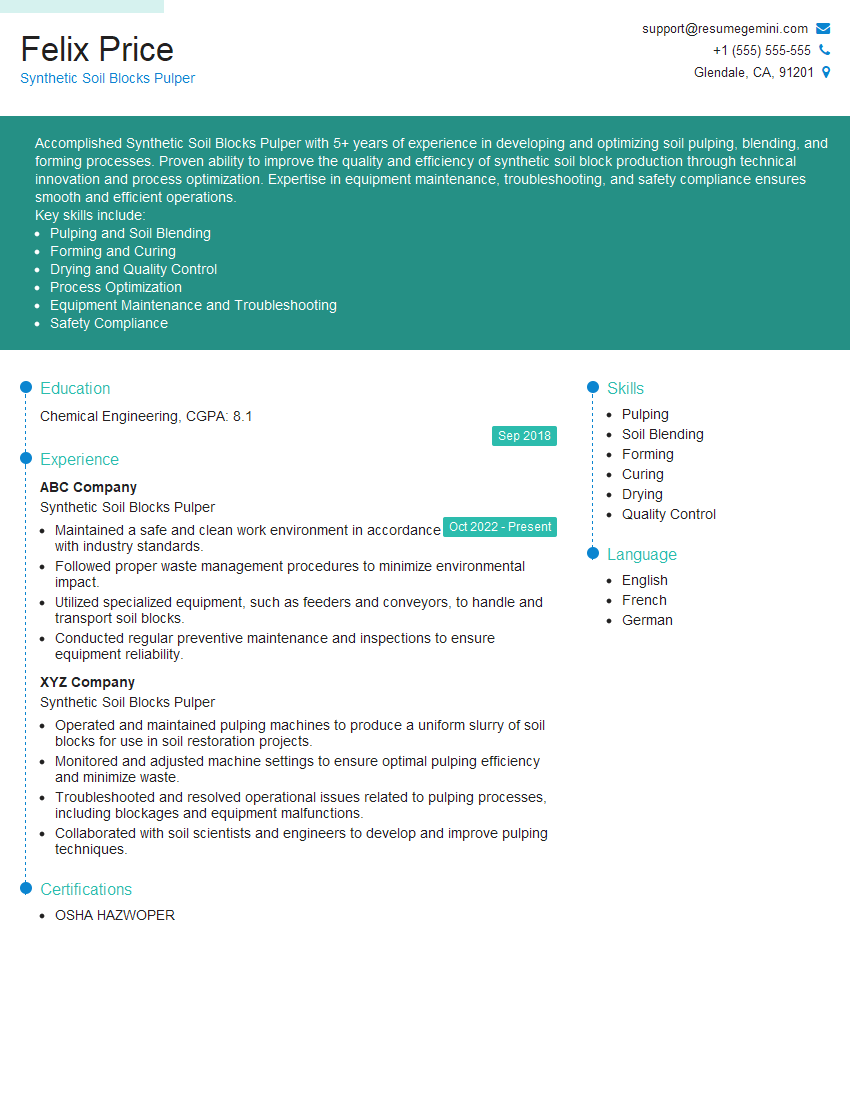Are you a seasoned Synthetic Soil Blocks Pulper seeking a new career path? Discover our professionally built Synthetic Soil Blocks Pulper Resume Template. This time-saving tool provides a solid foundation for your job search. Simply click “Edit Resume” to customize it with your unique experiences and achievements. Customize fonts and colors to match your personal style and increase your chances of landing your dream job. Explore more Resume Templates for additional options.

Felix Price
Synthetic Soil Blocks Pulper
Summary
Accomplished Synthetic Soil Blocks Pulper with 5+ years of experience in developing and optimizing soil pulping, blending, and forming processes. Proven ability to improve the quality and efficiency of synthetic soil block production through technical innovation and process optimization. Expertise in equipment maintenance, troubleshooting, and safety compliance ensures smooth and efficient operations.
Key skills include:
- Pulping and Soil Blending
- Forming and Curing
- Drying and Quality Control
- Process Optimization
- Equipment Maintenance and Troubleshooting
- Safety Compliance
Education
Chemical Engineering
September 2018
Skills
- Pulping
- Soil Blending
- Forming
- Curing
- Drying
- Quality Control
Work Experience
Synthetic Soil Blocks Pulper
- Maintained a safe and clean work environment in accordance with industry standards.
- Followed proper waste management procedures to minimize environmental impact.
- Utilized specialized equipment, such as feeders and conveyors, to handle and transport soil blocks.
- Conducted regular preventive maintenance and inspections to ensure equipment reliability.
Synthetic Soil Blocks Pulper
- Operated and maintained pulping machines to produce a uniform slurry of soil blocks for use in soil restoration projects.
- Monitored and adjusted machine settings to ensure optimal pulping efficiency and minimize waste.
- Troubleshooted and resolved operational issues related to pulping processes, including blockages and equipment malfunctions.
- Collaborated with soil scientists and engineers to develop and improve pulping techniques.
Certificates
- OSHA HAZWOPER
Languages
- English
- French
- German
Career Expert Tips:
- Select the ideal resume template to showcase your professional experience effectively.
- Master the art of resume writing to highlight your unique qualifications and achievements.
- Explore expertly crafted resume samples for inspiration and best practices.
- Build your best resume for free this new year with ResumeGemini. Enjoy exclusive discounts on ATS optimized resume templates.
How To Write Resume For Synthetic Soil Blocks Pulper
- Highlight your education and any relevant certifications in Chemical Engineering or a related field.
- Quantify your accomplishments using specific metrics and data whenever possible.
- Demonstrate your expertise in soil science, pulping techniques, and quality control methods.
- Showcase your ability to work independently and as part of a team in a manufacturing environment.
Essential Experience Highlights for a Strong Synthetic Soil Blocks Pulper Resume
- Supervise and operate pulping equipment to create a homogeneous soil mixture.
- Control and adjust soil moisture content, pH levels, and nutrient composition to meet product specifications.
- Set up and maintain forming machines to produce soil blocks of various sizes and shapes.
- Monitor curing and drying processes to ensure proper soil block hardening and moisture removal.
- Conduct regular quality control tests to assess the physical and chemical properties of soil blocks.
- Troubleshoot equipment malfunctions, conduct preventive maintenance, and implement process improvements.
- Adhere to safety protocols, maintain a clean and organized work environment, and follow GMP guidelines.
Frequently Asked Questions (FAQ’s) For Synthetic Soil Blocks Pulper
What is synthetic soil?
Synthetic soil is a man-made material designed to mimic the properties of natural soil. It is typically made from a blend of organic and inorganic materials, and it can be used for a variety of purposes, including plant growth, erosion control, and water filtration.
What are the benefits of using synthetic soil?
Synthetic soil offers a number of benefits over natural soil, including:
- Consistency: Synthetic soil is always the same, regardless of where it is sourced. This makes it ideal for applications where consistency is important, such as in scientific research or plant production.
- Control: The composition of synthetic soil can be precisely controlled, which allows it to be tailored to the specific needs of plants. This can lead to improved plant growth and yields.
- Sustainability: Synthetic soil can be made from recycled materials, making it a more sustainable option than natural soil.
What are the applications of synthetic soil?
Synthetic soil has a wide range of applications, including:
- Plant growth: Synthetic soil can be used to grow plants in a variety of settings, including greenhouses, indoor gardens, and vertical farms.
- Erosion control: Synthetic soil can be used to control erosion on slopes and other areas where soil is at risk of being washed away.
- Water filtration: Synthetic soil can be used to filter water and remove impurities.
What are the challenges of working as a Synthetic Soil Blocks Pulper?
The challenges of working as a Synthetic Soil Blocks Pulper can include:
- The work can be physically demanding, as it involves lifting heavy materials and operating machinery.
- The work can be repetitive and monotonous, as it involves performing the same tasks over and over again.
- The work environment can be dusty and noisy.
What are the career prospects for Synthetic Soil Blocks Pulpers?
The career prospects for Synthetic Soil Blocks Pulpers are good. The demand for synthetic soil is growing, as it is becoming more popular for use in a variety of applications. This demand is expected to continue to grow in the future, as synthetic soil becomes more widely accepted and used in new applications.
What are the skills required to be a successful Synthetic Soil Blocks Pulper?
The skills required to be a successful Synthetic Soil Blocks Pulper include:
- A strong knowledge of soil science and plant growth.
- Experience in operating pulping and forming equipment.
- Excellent quality control skills.
- The ability to work independently and as part of a team.
- Excellent communication and interpersonal skills.